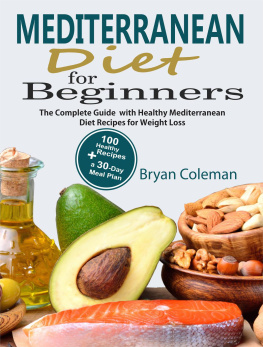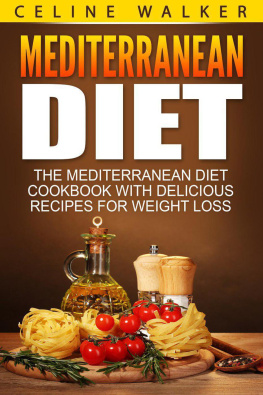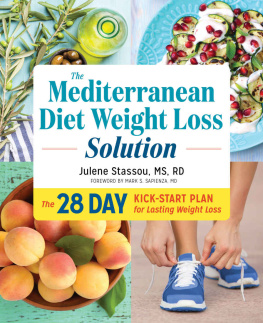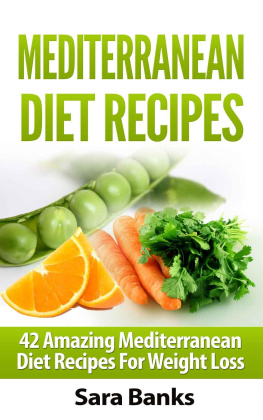Mediterranean Diet Cookbook for Beginners
A Complete and Balanced Diet: A Smart and Specific 4-Week Meal Plan for Every Need With Lots of Easy and Quick Recipes to Cook
GRACE M. WILLIAMSON
Copyright 2021 - All rights reserved.
The content contained within this book may not be reproduced, duplicated or transmitted without direct written permission from the author or the publisher.
Under no circumstances will any blame or legal responsibility be held against the publisher, or author, for any damages, reparation, or monetary loss due to the information contained within this book,either directly or indirectly.
Legal Notice:
This book is copyright protected. It is only for personal use. You cannot amend, distribute, sell, use, quote or paraphrase any part, or the content within this book, without the consent of the author or publisher.
Disclaimer Notice:
Please note the information contained within this document is for educational and entertainment purposes only. All effort has been executed to present accurate, up to date, reliable, complete information. No warranties of any kind are declared or implied. Readers acknowledge that the author is not engaged in the rendering of legal, financial, medical or professional advice. The content within this book has been derived from various sources. Please consult a licensed professional before attempting any techniques outlined in this book.
By reading this document, the reader agrees that under no circumstances is the author responsible for any losses, direct or indirect, that are incurred as a result of the use of the information contained within this document, including, but not limited to,errors, omissions, or inaccuracies.
Table of Contents
Introduction
The Mediterranean diet is not new; it is one of the healthiest diets you can adopt. This diet is based on the regular eating patterns of those living in the Mediterranean regions such as Greece, Italy, and Spain. The protocols recommended by this diet are quite simple. It is essentially a plant-based diet that consists of heart-healthy fats and plenty of seafood. Calling it a diet is not entirely right, because it is more like a way of living. This diet encourages you to make good food choices and increases your consumption of fresh vegetables, fruits, whole grains, nuts and seeds, herbs and spices, legumes, and naturally fatty seafood. The Mediterranean diet is incredibly easy to follow and can be customized to suit your lifestyle. All you need to do is become conscious about your food choices. Yes, it is as simple as that!
In this book, you will learn about the origins of the well-balanced Mediterranean diet, the benefits it offers, dietary protocols, a detailed food list, and steps to get started. This book also includes tried and tested suggestions to accelerate your progress with the Mediterranean diet. Once you understand more about the diet, you can explore the different recipes provided in this book. All the recipes included are divided into different categories for your convenience. This book also includes a well-structured meal plan making it easy for you to get started with this diet.
Even if you are a novice, the recipes given in this book will make cooking quite easy. All you need to do is simply gather the required ingredients, choose a recipe, and follow the instructions. These are the only steps you need to follow to cook delicious, quick, and healthy meals within no time.
So, are you excited to learn about the Mediterranean diet? If yes, let's get started immediately!
Chapter One: What is the Mediterranean Diet?
The health benefits of the Mediterranean diet were first observed by Dr. Ancle Keys and his colleagues. During the 1950s and 1960s, Dr. Keys formed a hypothesis that those residing in the Mediterranean region were healthier when compared to others, especially compared to those in the Western Hemisphere. He associated these health benefits with the diet that those who live there follow. The coast of the Mediterranean Sea has 18 countries: Greece, Cyprus, Israel, Syria, Lebanon, Malta, southern France, Italy, Croatia, Bosnia, Spain, Turkey, Morocco, Algeria, Libya, Tunisia, Albania, and Egypt.
Despite the wide cultural diversity in these countries, their cuisine is quite similar. A commonality between the cuisines of all these regions is their reliance on fresh ingredients. The diet in these regions is typically a plant-based diet rich in seafood and plenty of olive oil. Temperature, climatic conditions, and location are some of the topographical factors responsible for making the cuisine of the Mediterranean region unique. Another similarity between the cuisine of these countries is the use of bold and flavorful spices and herbs, which complement and enhance the flavor of all the fresh ingredients used. This forms the basis of the Mediterranean diet.
A typical Mediterranean meal is well-balanced, rich in nutrients, flavors, colors, and textures. Whether it is a fresh filet of salmon served with a handful of salad leaves, crunchy nuts drizzled with olive oil and crumbled cheese, or a plate of figs topped with Greek yogurt and honey, the Mediterranean diet is rich in flavors. Unlike most fad diets, this is not restrictive by any means. If anything, the Mediterranean diet includes a variety of plant-based foods, seafood, and dietary fats.
The Mediterranean diet is not a low-fat or a low-carb diet. Instead, it is a well-balanced eating pattern that includes all the macro and micronutrients your body needs. It is devoid of processed and pre-packaged foods that dominate the typical Western diet such as processed meats, unhealthy carbs and sugars, and harmful trans fats. Instead, it shifts your focus to nutrient-dense ingredients your body needs to function efficiently. Even though it is a predominantly plant-based diet, it is not strictly vegetarian. It includes different types of naturally fatty fish, seafood, poultry, and limited amounts of red meat.

An important part of the Mediterranean diet is that it is a lifestyle and not just a diet. The Mediterranean culture is a celebration of food and people. It is about sharing meals with your loved ones and savoring food instead of mindless eating. Another characteristic of this diet is that it includes red wine! Yes, you read that right! Having a glass of red wine with a Mediterranean meal is quite common. The antioxidants present in red wine are good for your health. But, as with anything else in life, there needs to be moderation. This Mediterranean lifestyle doesnt promote leading a sedentary life, and instead, encourages you to engage in some form of physical activity or another. When you put all these factors together, the Mediterranean lifestyle is a great way to improve your physical and mental health.
Myths About the Mediterranean Diet
These days, any information is just a click away, but this easy access to information comes with its own set of problems. For instance, the spread of misinformation is quite high. Before you learn more about this diet, it is important to let go of certain misconceptions and myths associated with the Mediterranean diet.
Myth #1: The Mediterranean Diet Applies Only to the Mediterranean Region
This is one of the most common myths associated with this diet. Remember, it is based on the eating patterns of those residing in the Mediterranean region. If you take a moment and think about it, there's no reason to believe you cannot follow this diet as well. It is predominantly a plant-based diet that encourages the consumption of wholesome vegetables, fruits, legumes, whole grains, plenty of seafood, and poultry. All the food prescribed by this diet can be found anywhere and you can easily customize the meals according to your taste and preferences.
















